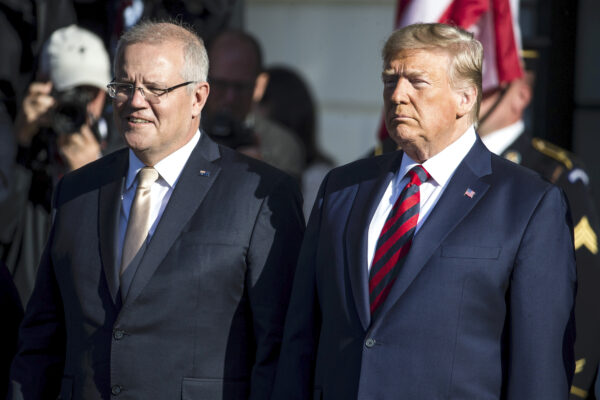US–Australia Could Disconnect If Victorias Belt and Road Is a Risk: Pompeo
The U.S. Secretary of State says the United States will “simply disconnect” with Australia if the Vi..
The U.S. Secretary of State says the United States will “simply disconnect” with Australia if the Victorian states Belt and Road partnership with Beijing presents any risk to telecommunications infrastructure.
Mike Pompeo told Sky News on May 24 that the United States was keen to continue working with Australia on security and that it was a “great partner,” but it needed to prioritise the safety of its own telecommunications network.
“We will not take any risk to our telecommunications infrastructure, any risk to national security elements with our Five Eyes partners. We are going to protect and preserve the security of those institutions,” he said.
“I dont know the nature of those (Victorias) projects precisely, but to the extent they have an adverse impact on our ability to protect telecommunications from our private citizens, or security networks for our defence, or intelligence communities, we will simply disconnect, we will simply separate,” Pompeo said.
“We are going to trusted networks for important information. We hope our friends, partners, allies around the world, especially allies like Australia, will do the same.”
Pompeo also warned Australia that projects that form part of the Chinese Communist Partys (CCPs) Belt and Road Initiative (BRI) need to be looked at carefully, and every project from BRI had a “cost to it.”
“Often money is loaned at concessional rates, or conditions are placed in debt documents, or government concessions have to be made to the Chinese Community Party in order to get those (BRI) projects built,” Pompeo said.
“(They) present real risks to the people, and real risk to the country. Frankly, they build up the capacity of the (CCP) to do harm in other ways as well.”
So far, Victorias Labor Premier Daniel Andrews has signed two agreements with Beijings National Development and Reform Commission, progressing the states involvement in the BRI. A third agreement is due to be signed middle of 2020.
Victorias BRI At Odds With Federal Policy
Victorias involvement in BRI has been a consistent source of controversy, as it has placed the state at odds with the federal governments stance on the project.
Australian Prime Minister Scott Morrison told a press conference on May 24 that the federal government did not support Victorias actions.

“National interest issues on foreign affairs are determined by the federal government,” Morrison said.
“I respect their jurisdiction when it comes to the issues they are responsible for, and its always been the usual practice for states to respect and recognise the role of the federal government in setting foreign policy.
“I think thats always been a good practice.”
Last week, Home Affairs Minister Peter Dutton called the BRI a “propaganda exercise from China.”
Dutton said he was “gravely concerned,” citing a series of issues involving the Chinese communist regime, including its claims in the South China Sea, its militarisation of ports in the Asia Pacific, and its attempts to “buy influence” in Australia.
“Victoria needs to explain why its the only state in the country that has entered into this relationship,” he said.
The Morrison governments pushback against the projects has received bipartisan support with Labor Senator Kimberley Kitching writing on Twitter on May 20 that Victoria “erred in signing up” to the BRI.
Liberal Senator Concetta Fierravanti-Wells told The Epoch Times on May 11 that the BRI was “skulduggery” by the Chinese communist regime and it was “code” for debt-trap diplomacy.
“Those leading our fellow traveller foreign policy over many years and those doing business with China have preferred to turn a blind eye to CCPs skulduggery so long as cash flows were maintained,” said Fierravanti-Wells.
“Fellow traveller” refers to individuals who are not communists, yet sympathise with the communist partys goals and policies.
“This approach has led to our present predicament and has made us more vulnerable to economic coercion as was evidenced by the Chinese Ambassadors [threats],” she said.
Telecommunications the New Vanguard of BRI
U.S. based defence think tank, the Center for Strategic and International Studies (CSIS), published a paper on April 13, highlighting how the Chinese communist regime has been actiRead More – Source

